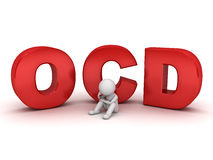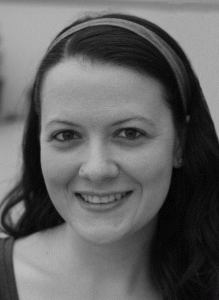 Editor and Founder Vrinda Pendred discusses peeling back the layers of OCD to see what lies at the source of our obsessions – and how to overcome them.
Editor and Founder Vrinda Pendred discusses peeling back the layers of OCD to see what lies at the source of our obsessions – and how to overcome them.
Last time, we talked about what it’s like to have OCD as a child, and some ways to recognise if your child has it. At the end of that article, I mentioned that there are medical causes of OCD, but that I think the specific obsessions we develop stem from life experiences and emotional problems. A huge part of my recovery from OCD was intense self-reflection and identification of the roots of each one of my obsessions – and that’s what we’re going to talk about this month.
OCD Origins
It is generally accepted that to have OCD, there needs to be some kind of medical / biological predisposition to it. All the evidence points to it being an inherited genetic trait, and this is definitely the case within my family. However, my personal theory is that these inherited traits could lie relatively dormant unless triggered / activated by certain experiences in life.
To give a very personal example, I have mentioned in previous articles my former fears of hands coming at me through walls or from under my bed, and a man appearing in my room with an axe raised to strike me. For years, I lived with the conviction that someone was following me, hunting me, and that there was no escape from him. It hit me in my 20s that I knew exactly who this ‘man’ was – actually, not a man at all, but a boy not much older than me, who abused me when I was very small. Up to that point, I had sincerely believed that series of experiences no longer affected me. It was a revelation for me, to see that I had been carrying them with me for so long, in an abstracted way.
Figuring this out was extremely empowering, because it meant I could put a name and a face on my previously faceless pursuer. And that meant I could reason with myself, ‘That was years ago. I don’t know him anymore. And to do what he did, at the age that he did it, he had to have been abused himself. That means he’s not scary or dangerous – he was a victim too, and the whole story is very sad.’ I could feel sorry for both my childhood self and that lost little boy I once knew – and begin to put it behind me.
Similarly, I have spoken about my obsession with keeping things straight and in order, needing perfectly even handwriting strokes, and so forth. In short, it was a need for control. I even tried to control my friends – what they did and what they said. It wasn’t because I’m a controlling person, although people definitely thought I was – I remember being called ‘bossy’ for years. I was too young and insecure to explain what was really going on. In fact, I found it all exhausting, and I frequently chose to be alone: socialising just felt like too much work. Sometimes it still does.
So why did I do it? Because my home environment felt so out of control. I would liken it to anorexia – it’s a way of getting control over something, when everything else feels out of your hands. No one actually wants to stop eating; they desperately need to feel like just one thing in life is theirs, even if everything else is spiralling and sweeping them away. In my case, I grew up in a household of domestic violence. All my ‘bossy’ and neurotic behaviour was my way of holding things together when I felt like everything around me was falling apart and there was nothing I could do about it.
Being exposed to violence at a very young age also meant that I never had that childhood sense of invincibility. I always knew my time on this planet was finite and one day I – and everyone I knew – would die. This was another source of terror for me, namely because, again, it’s completely beyond my control. It is unknowable and unstoppable. I can’t stand feeling helpless, and I often feel a need to save people: I think part of what scares me about death is that I can’t save anyone from it. To cope with these fears, I hoarded – useless items, photographs, videos, music, memories (diaries, letters, etc.). A few years ago, our external hard drive broke and I lost 7 years’ worth of home videos. I went through a very sincere period of grief akin to what I felt when someone I loved died.
But It’s Not All About Trauma
You might be reading this and thinking all of these are extreme examples – surely not everyone with OCD has lived through abuse and domestic violence! And that’s true. I have a number of friends with OCD, some whom I’ve known since we were small. (I think there’s a certain personality type that goes along with anxiety disorders, and it’s common for us to be drawn to each other without quite knowing why.) I recall one of them, in particular, didn’t really display any signs of OCD until we went to high school. She found herself in such a new environment, a small fish in a big sea of new, complex social interactions and intense demands from school itself. She started drowning under the stress and overwhelm and she began coping with it via compulsions. I have heard many others share stories like this, so I think it’s pretty common.
What Does All This Mean for Me?
If you have OCD yourself, try to strip away the compulsions and look at what lies beneath all those coping mechanisms. What are you really afraid of? What’s the source of it all?
Will this immediately ‘cure’ you of your OCD? No. But in my experience, it is the first step to self-empowerment – to understanding what’s really going on, gaining greater self-awareness, and beginning to be able to look all those old fears in the face and accept that probably a lot of them no longer have a place in your life; you’ve just got used to them, over the years. And that means you can begin to let them go.
If your compulsions stem from problems that are happening right now – well, I’d say that identifying those underlying fears and worries could help you think of ways to get out of those situations, or at least give yourself a break from it, to ease the strain.
In the same way, if you’re a parent of a child with OCD and the compulsions seem to go through the roof whenever your child has a growth spurt or during adolescence – give yourself, and your child, a break. I suspect a lot of it is a reaction to a time in their life when everything feels out of their hands. Part of the solution is, without a doubt, to look for ways you can help ensure that their environment is as stable, controlled, predictable and supportive as possible. Then take things a step further: get creative and think of simple, healthy ways you can give your child greater control over their lives. It could be as simple as giving them more choice in what they eat at meal times.
To give another personal example, our youngest (currently four years old) doesn’t have OCD (at least, there are no signs yet), but he absolutely refused to eat anything we gave him at meal times. I had come to dread these times of day, as I knew it would be a battle and involve a lot of screaming and tears. (All he wanted to eat was cheese.) We tolerated it when he was smaller, but at four he really needed to start eating better, especially if he is due to start school later this year. So I came up with the idea to let him look through the cutlery drawer and choose his fork / spoon. It hit me that maybe if we gave him this little bit of control, he would feel more comfortable giving up control over what food he ate – and it worked. It can still be a challenge sometimes, but on the whole, he’s very good at meal times and takes great pride in choosing that fork / spoon. Hopefully, by the time he goes to school, he’ll be conditioned enough into eating a variety of food that he won’t be bothered by them inevitably not letting him choose his cutlery…!
Final Thoughts
The takeaway, here, is that our obsessions and compulsions can start out small and then spiral in a big way, until they take over our lives, even when the original source of those obsessions has been gone from our lives for years. We condition ourselves over time to respond in certain ways, even when we know it’s not good for us – and I think all of it boils down to trying to get something under control, when everything around us feels so out of control.
Peeling back the layers and examining those sources can help us see what inspired the obsessions. Facing them head on can help us overcome them. That is the first step in reconditioning ourselves. Our brains are amazing things, and we can continue to train them all through life. It is never hopeless.
Thank you so much for joining me again, this month, as we continue our exploration of OCD. Be sure to subscribe to this blog so you don’t miss any future articles.
And finally, if you’d really like to get into the mind of someone with OCD and learn what it’s like to live with – and try to overcome – not just this condition but fear in general, please read my novel Equilibria:
Anna Nolon is obsessive – about everything. She worries about her grades, her appearance, germs, the pattern of her footsteps, the number of syllables in the words she says, her parents’ approval, the future and, most of all, death. It’s okay – so does everyone else. This is Equilibria: the first society built to accommodate OCD. But when Aaron comes along – the strange new boy who doesn’t quite fit into that pristine society of Holy Balance and Order – Anna is forced to look at the dark shadows hanging over her and decide if perfection is really what she wants.
Until next time….
Vrinda Pendred is a graduate of English with Creative Writing at Brunel University. She completed work experience with Random House and proofread for Mandala Publishing. She is married with two children and lives in Hertfordshire, England, where she does freelance editing and proofreading. She is also a writer, and you can learn more about her personal work here.
Vrinda has been diagnosed with five neurological conditions: Tourette’s Syndrome, Obsessive-Compulsive Disorder, ADHD, High-Functioning Autism and bipolar disorder. In 2010, she founded Conditional Publications with the intention of providing a creative outlet for people, and (hopefully) changing a few minds out there about what neurological disorders really are – including not just the limitations, pain or frustration, but also the more positive, beneficial ‘symptoms’ of these strange conditions.
She made three contributions to Conditional Publications’ debut release Check Mates: A Collection of Fiction, Poetry and Artwork about Obsessive-Compulsive Disorder, by People with OCD. Since then, she has released a novel entitled The Ladder, inspired by her personal struggle with bipolar disorder, as well as a number of short stories, the YA sci-fi /fantasy series called The Wisdom, and Equilibria, a YA dystopia about a society engineered for people living with OCD.









